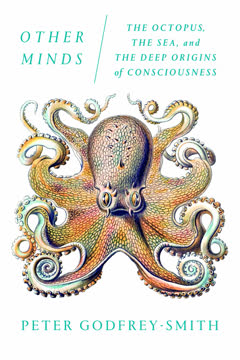Key Takeaways
1. The Sea: Birthplace of Complex Life and Consciousness
"The mind evolved in the sea. Water made it possible. All the early stages took place in water: the origin of life, the birth of animals, the evolution of nervous systems and brains, and the appearance of the complex bodies that make brains worth having."
Origin of Complexity. The ocean was not just a backdrop for life's emergence, but an active environment that facilitated incredible transformations. The sea's chemical dynamics, fluid dynamics, and abundant resources created unique conditions for life's complexity to unfold.
Key Marine Evolution Insights:
- Single-celled organisms first developed sophisticated chemical communication
- Early multicellular life emerged through collaborative cellular interactions
- Water's properties enabled intricate molecular exchanges and signaling
Metaphorical Significance. The ocean represents more than a physical space—it's a dynamic system of constant interaction, adaptation, and potential, mirroring the evolutionary processes that generate complexity and consciousness.
2. Evolution's Branching Paths: From Single Cells to Complex Organisms
"The history of animals has the shape of a tree. A single 'root' gives rise to a series of branchings as we follow the process forward in time."
Evolutionary Diversification. Life's progression is not linear but a complex, branching process where species split, diverge, and explore different evolutionary strategies. Each branch represents a unique experiment in survival and adaptation.
Evolutionary Strategies:
- Multicellularity emerged through cells collaborating and specializing
- Different body plans (like bilaterian) enabled new behavioral possibilities
- Environmental pressures drove innovations in sensing and acting
Unpredictability of Evolution. Each branching represents a moment of potential, where subtle changes can lead to dramatically different outcomes, highlighting evolution's creative and contingent nature.
3. The Extraordinary Nervous Systems of Cephalopods
"Cephalopods are an island of mental complexity in the sea of invertebrate animals."
Unique Neural Architecture. Cephalopods developed nervous systems fundamentally different from vertebrates, with neurons distributed throughout their bodies, especially in their arms, creating a decentralized intelligence.
Neural Innovations:
- Octopuses have 500 million neurons, comparable to some mammals
- Arms can act semi-independently, with local decision-making capabilities
- Nervous system spread allows for remarkable body flexibility and adaptability
Convergent Intelligence. Cephalopods represent an independent evolutionary experiment in developing large, complex nervous systems, demonstrating that intelligence can emerge through different biological pathways.
4. Octopuses: Intelligence Beyond Vertebrate Imagination
"This is probably the closest we will come to meeting an intelligent alien."
Radical Embodiment. Octopuses challenge conventional understanding of intelligence by possessing a body with almost no fixed shape, enabling unprecedented behavioral flexibility and problem-solving.
Cognitive Capabilities:
- Can recognize individual humans
- Demonstrate curiosity and exploratory behavior
- Capable of complex tool use and environmental manipulation
Philosophical Implications. Octopuses reveal that intelligence is not confined to brain-centric, vertebrate-like configurations but can emerge through radically different bodily organizations.
5. The Mysterious Origins of Subjective Experience
"Subjective experience is the most basic phenomenon that needs explaining, the fact that life feels like something to us."
Emergence of Consciousness. Consciousness likely evolved gradually, with early forms of subjective experience emerging from basic sensing and acting capabilities in simple organisms.
Evolutionary Progression:
- Pain and basic sensory experiences might predate complex consciousness
- Different animal lineages likely developed subjective experience independently
- Consciousness emerged through increasing complexity of nervous systems
Philosophical Challenge. Understanding consciousness requires moving beyond binary thinking, recognizing it as a spectrum of experiences across different life forms.
6. Color, Camouflage, and Communication in Cephalopods
"These animals shaped my path through the philosophical problems; following them through the sea, trying to work out what they're doing, became an important part of my route in."
Sophisticated Skin Dynamics. Cephalopods possess an extraordinary ability to change colors and patterns rapidly, serving functions beyond simple camouflage.
Color Communication Mechanisms:
- Millions of color-controlling cells (chromatophores)
- Ability to match backgrounds with incredible precision
- Potential for complex signaling through color variations
Expressive Complexity. Color changes might represent not just survival strategies but a form of communication and potential emotional expression.
7. Language, Inner Speech, and Cognitive Evolution
"Language provides a medium for the arrangement and manipulation of ideas."
Language as Cognitive Technology. Inner speech evolved as a powerful cognitive tool for organizing thoughts, planning, and self-regulation.
Language's Cognitive Functions:
- Enables complex reasoning and problem-solving
- Facilitates executive control and decision-making
- Allows mental simulation and strategic thinking
Neurological Innovation. Inner speech represents a remarkable cognitive adaptation, transforming communication from an external to an internal process.
8. The Paradox of Short-Lived, Intelligent Creatures
"What is the point of building a large nervous system if your life is over in a year or two?"
Evolutionary Efficiency. Cephalopods' brief lifespans are shaped by predation risks and reproductive strategies, not a limitation of potential.
Lifespan Determinants:
- Vulnerability to predators influences evolutionary adaptations
- Rapid reproduction compensates for short individual lifespans
- Different environmental conditions can dramatically alter lifespan
Biological Flexibility. Lifespans are not fixed but dynamically responsive to environmental conditions and evolutionary pressures.
9. Parallel Evolutionary Experiments in Intelligence
"Cephalopods and smart vertebrates are independent experiments in the evolution of the mind."
Convergent Complexity. Different evolutionary lineages can independently develop complex intelligence through distinct biological pathways.
Parallel Intelligence Development:
- Vertebrates and cephalopods evolved large brains separately
- Similar cognitive capabilities emerged through different neural architectures
- Intelligence is not a linear progression but a multifaceted phenomenon
Philosophical Insight. Intelligence is not a predetermined destination but an exploratory process with multiple potential solutions.
10. Humans and Octopuses: Distant Cousins in the Tree of Life
"When you dive into the sea, you are diving into the origin of us all."
Shared Evolutionary Heritage. Despite vast differences, humans and octopuses share fundamental biological connections through common ancestral organisms.
Interconnected Life:
- Last common ancestor existed around 600 million years ago
- Both lineages developed complex nervous systems independently
- Fundamental biological processes reveal deep evolutionary relationships
Existential Perspective. Studying distant evolutionary relatives provides profound insights into life's creative potential and interconnectedness.
Last updated:
FAQ
What's Other Minds about?
- Exploration of consciousness: Other Minds by Peter Godfrey-Smith explores the evolution of consciousness, focusing on cephalopods like octopuses and cuttlefish. It examines their complex behaviors and intelligence despite different evolutionary paths.
- Evolutionary perspective: The book traces the history of animals to their common ancestors, exploring how consciousness evolved over millions of years. This narrative provides a framework for understanding the development of minds in various species.
- Philosophical inquiry: Godfrey-Smith combines philosophy with biology, asking profound questions about the nature of mind and experience. He seeks to understand how sentience arises from biological processes.
Why should I read Other Minds?
- Unique insights into intelligence: The book offers a fresh perspective on intelligence by examining cephalopods, challenging the view that intelligence is exclusive to mammals and birds.
- Engaging narrative style: Godfrey-Smith writes in an accessible manner, making complex scientific concepts understandable. His personal experiences with cephalopods add a captivating element.
- Philosophical depth: Readers interested in consciousness will find thought-provoking discussions. It encourages reflection on what it means to be sentient and how different life forms experience the world.
What are the key takeaways of Other Minds?
- Consciousness is evolutionary: The book emphasizes that consciousness evolved gradually through complex biological processes, highlighting the continuity of life and shared experiences across species.
- Cephalopods as intelligent beings: Godfrey-Smith argues that cephalopods showcase complex behaviors and problem-solving abilities, suggesting a form of sentience distinct from mammals.
- Mind-body connection: The author explores how an organism's body influences its mind, raising questions about how different bodies shape consciousness.
How does Other Minds relate to the philosophy of mind?
- Philosophical exploration: Godfrey-Smith engages with classic philosophical questions about consciousness and subjective experience, bridging philosophical inquiry and scientific understanding.
- Evolutionary approach: The book suggests that understanding the development of minds in different species can inform philosophical discussions about sentience, challenging views focused solely on human consciousness.
- Mind-body relationship: The author examines how cephalopods' physical structure influences their mental experiences, contributing to the discourse on the connection between mind and body.
What role do cephalopods play in understanding consciousness in Other Minds?
- Independent evolution of intelligence: Cephalopods have evolved complex nervous systems and behaviors independently from mammals, making them crucial for studying alternative forms of intelligence.
- Unique sensory experiences: The book highlights how cephalopods perceive and interact with their environment, offering insights into different modes of consciousness.
- Comparative analysis: By comparing cephalopods to other intelligent species, Godfrey-Smith provides a broader context for understanding consciousness.
What are the best quotes from Other Minds and what do they mean?
- “If we can make contact with cephalopods as sentient beings...” This quote underscores the idea that intelligence can arise independently in different evolutionary paths, highlighting cephalopods' uniqueness.
- “The octopus is not a survivor but a second expression...” Godfrey-Smith suggests octopuses represent a parallel evolution of intelligence, emphasizing life's diversity.
- “The history of animals has the shape of a tree.” This metaphor illustrates the branching evolution of species, indicating how different life forms emerged from common ancestors.
How does Peter Godfrey-Smith connect cephalopods to consciousness?
- Evolutionary insights: Godfrey-Smith argues that studying cephalopods provides insights into the evolution of consciousness, reflecting parallel evolutionary paths to those in vertebrates.
- Comparative analysis: He compares cephalopod intelligence to mammals and birds, highlighting similarities and differences in cognitive abilities.
- Philosophical framework: By integrating philosophical discussions, Godfrey-Smith enriches the scientific analysis of cephalopod behavior, emphasizing inner speech and self-awareness.
How does Other Minds challenge traditional views of intelligence?
- Intelligence beyond mammals: Godfrey-Smith argues that intelligence is not limited to mammals and birds, as evidenced by cephalopods' complex behaviors.
- Diverse expressions of intelligence: The book highlights various ways intelligence can manifest, broadening the definition beyond traditional metrics.
- Evolutionary context: By placing cephalopods within an evolutionary framework, Godfrey-Smith illustrates how intelligence can arise independently in different lineages.
What scientific methods does Godfrey-Smith use in Other Minds?
- Comparative analysis: The author examines the evolutionary history of cephalopods alongside other intelligent species, deepening the understanding of consciousness development.
- Philosophical inquiry: Godfrey-Smith integrates philosophical questions with scientific research, exploring cephalopod intelligence's implications for understanding consciousness.
- Field observations: His fieldwork and observations of cephalopod behavior provide empirical evidence to support his arguments.
What evolutionary theories does Other Minds discuss?
- Medawar-Williams Theory: Godfrey-Smith explores this theory of aging, suggesting aging is a byproduct of natural selection, with late-acting mutations leading to age-related decline.
- Convergence and divergence: The book discusses convergent evolution, where different species develop similar traits independently, using cephalopods and vertebrates as examples.
- Cognitive evolution: Understanding cognition's evolution requires examining diverse pathways taken by different species, with cephalopods offering a unique perspective.
How does Godfrey-Smith describe the social behavior of octopuses in Other Minds?
- Complex interactions: Octopuses exhibit complex social behaviors, including aggression, cooperation, and communication, particularly in environments like Octopolis.
- Color change as communication: They use color change to communicate during social interactions, conveying information about intentions and emotional states.
- Ecosystem engineering: Octopuses modify their environment, creating shelters and dens that facilitate social interactions, illustrating their role as ecosystem engineers.
What is the significance of Octopolis in Other Minds?
- Unique habitat: Octopolis is a unique environment where octopuses exhibit social behaviors rarely observed in the wild, allowing for controlled study.
- Ecosystem engineering: The presence of a metal object has led to a shell bed, which octopuses use to create dens, enhancing social interactions and survival.
- Research opportunities: Octopolis provides valuable opportunities for researchers to observe and document octopus behavior, contributing to understanding cephalopod intelligence.
Review Summary
Other Minds explores the intelligence and consciousness of cephalopods, particularly octopuses and cuttlefish. Godfrey-Smith combines scientific observations with philosophical inquiries to examine the evolution of consciousness. While many readers found the book fascinating, some felt it meandered or lacked focus at times. The author's personal experiences with octopuses and cuttlefish provide engaging anecdotes. The book challenges readers to consider the nature of intelligence and consciousness in creatures vastly different from humans. Overall, it offers thought-provoking insights into the minds of these remarkable sea creatures.
Similar Books






Download PDF
Download EPUB
.epub digital book format is ideal for reading ebooks on phones, tablets, and e-readers.




